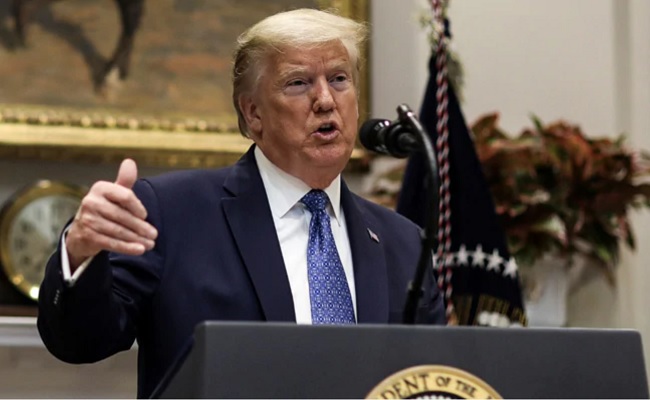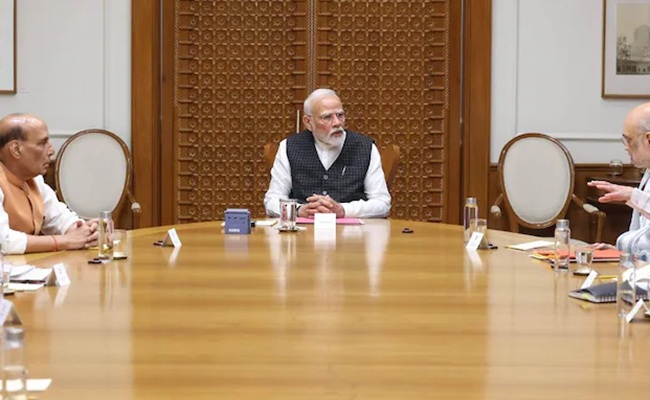
The mask has slipped. US president Donald Trump will now forever be part of America's grim coronavirus caseload statistics - 7.2 million and rising, the world's largest.
Thirty days before the US 2020 elections, Trump has been diagnosed with the Coronavirus, tossing his plans for the final political push into chaos. The man who urged his supporters to come in droves to super-spreader events and pushed states to "REOPEN!" is now quarantining while civil society struggles to find ways to get back to work and school in the absence of a single overriding health communication goal from the White House.
With vaccine availability at scale at least a few months away, how we absorb the new developments must necessarily begin by looking in the rear-view mirror. How did America get to this place, with 209,000 dead from the virus which has blasted through even the impressive armour of White House security cover?
To understand how we got here, we must go back to when Trump knew but we did not, because those known unknowns have been a signature of the American response to the worst public health crisis in modern history.
The charade played out even the night before Trump's positive diagnosis. The US president told his admirers, "I just want to say that the end of the pandemic is in sight, and next year will be one of the greatest years in the history of our country."
Exactly 24 hours later, the virus story came full circle. Trump and the First Lady announced they would quarantine.
We pick three moments from the last eight months that define the story of the American COVID catastrophe. All of them have a signature Trump anthem: Circling the wagons.
Feb 6, 2020. First, we must go back to before Trump called Bob Woodward, on February 7 at 9 am. In the spirit of diligent contact tracers, we must tie each dot further back. At around half past 9 in the morning on February 6, On Thursday, February 6, 2020, Dr. Nancy Messonnier, Director of the National Center for Immunization and Respiratory Diseases (NCIRD), US Centers for Disease Control and Prevention and Dr. Barbara Marston, Head of International Task Force for Coronavirus, Center for Global Health, US Centers for Disease Control and Prevention, got on a call with reporters.
IANS was there. "We are preparing as if it is a pandemic, while hoping it is not," Dr. Messonier said that morning. On that day, the US had 12 confirmed cases of the virus. After she uttered the word "pandemic", we haven't heard back from Messonier in the public domain. The first reported death from the virus was still three weeks away. Messonier was instantly sidelined.
Feb 7, 2020. Exactly 24 hours later after Nancy Messonier briefed the media, Trump called Bob Woodward, associate editor at The Washington Post. "It goes through air," Trump told Woodward. "That's always tougher than the touch. You don't have to touch things. Right? But the air, you just breathe the air and that's how it's passed. And so that's a very tricky one. That's a very delicate one. It's also more deadly than even your strenuous flus." That's not all. Trump told Woodward he "wanted to always play it down". Trump explained that he did not want to "create a panic".
August 13, 2020. Nearly eight months after the virus arrived on US shores and conflicting signals from Trump and the medical community, Dr. Anthony Fauci, America's top infectious diseases expert in Trump's virus task force, called America's flattening criteria "unacceptable". "Bottom line is, I'm not pleased with how things are going," Fauci said in a conversation with National Geographic. Pushed on the question of how America has fared relative to the rest of the world, Fauci said, "As long as you have any member of society, any demographic group, who is not seriously trying to get to the endgame of suppressing this, it will continue to smoulder and smoulder and smoulder," Fauci said. "And that will be the reason why we've plateaued at an unacceptable level." Masks, Fauci has repeatedly told Americans, must be seen as an essential tool for getting back to life as we knew it. Trump has always leaned in favour of it's "optional", making space for differing versions of liberty and the pursuit of sickening vulnerable people.
Even after the mandatory quarantine period, Trump's problem in the final fortnight before the election will be the same it's been in the last eight months: His inability to speak to real suffering with the dog whistle of culture war. Suddenly, Democratic challenger Joe Biden's "Shut up, man!" to Trump in the first presidential debate has taken on a whole new meaning.













